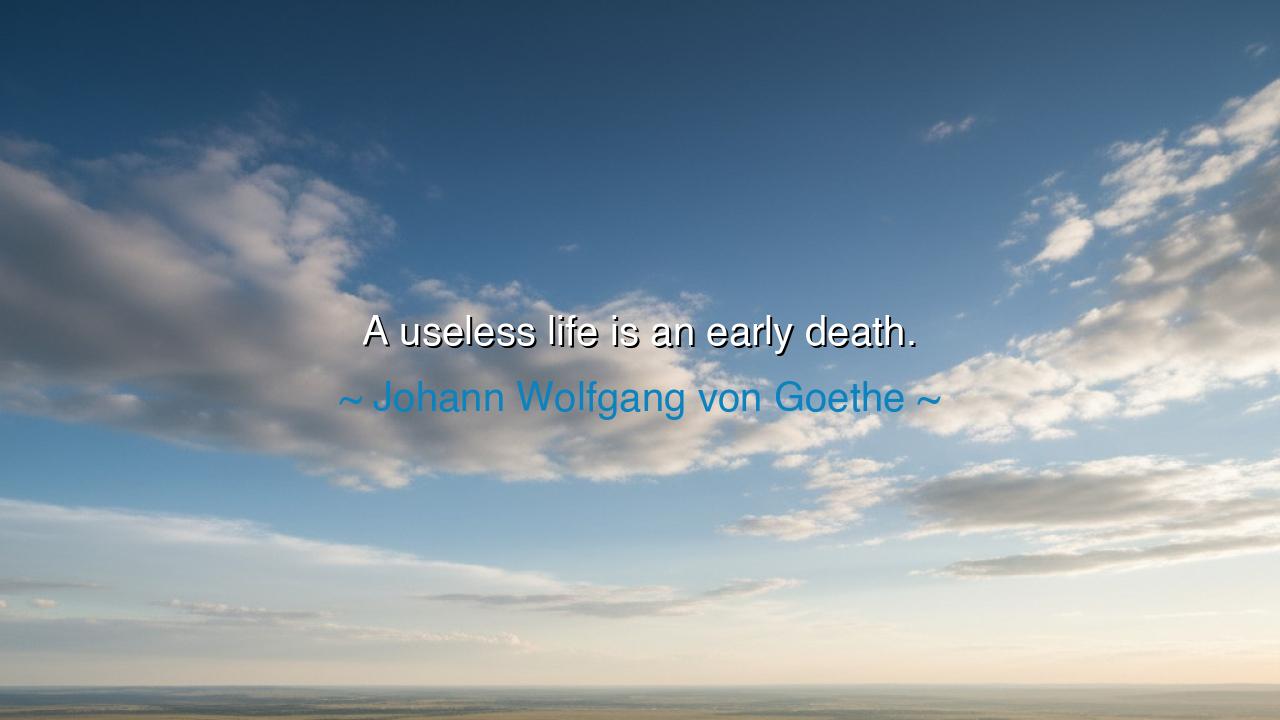
A useless life is an early death.






“A useless life is an early death.” Thus spoke Johann Wolfgang von Goethe, the sage of Weimar, the poet whose words still breathe life into the spirit of mankind. In this brief and piercing line, he unveils one of the deepest truths of existence—that to live without purpose, without service, without creation, is to die long before the body is laid in the grave. For life is not measured by the beating of the heart, but by the fire of meaning that burns within it. A man may live a hundred years and yet die in youth if his soul lies dormant; another may perish young and yet live forever through the works of his hands and the goodness of his deeds.
The origin of this saying arises from Goethe’s lifelong contemplation of vitality and purpose. He was not merely a poet, but a philosopher of the living world, one who saw in nature, art, and human striving the sacred rhythm of growth. His belief was simple yet profound: that the spirit of man is made to create, to act, to shape the world around it. In idleness, that spirit withers. In usefulness, it thrives. Goethe’s words echo the wisdom of the ancients—of Aristotle, who said that happiness lies in activity; of Marcus Aurelius, who taught that a man’s worth is measured by what he gives to the whole. To live without contributing to the great harmony of life, Goethe warns, is to choose a death of the soul long before the death of the flesh.
To call a life “useless” is not to judge it by wealth, power, or fame. Goethe speaks not of external success but of inner vitality. A life becomes useless when it ceases to grow—when one turns away from learning, from love, from compassion, from the call to labor for something beyond oneself. The scholar who hoards his knowledge, the artist who fears to create, the citizen who refuses to serve—all are as lifeless as unwatered trees. For the essence of life is motion, and when that motion ceases—when we no longer strive to better ourselves or others—we fall into an early death of spirit. It is a warning to all who would live in comfort without contribution, in ease without effort.
This truth is written in the stories of the great and the humble alike. Consider the tale of Leonardo da Vinci, whose restless curiosity knew no end. Though centuries have passed, his vitality still lives through his art and inventions, because he refused to let his life be idle. In every brushstroke and design, he extended his being beyond the confines of time. Compare this to the tale of those who, though surrounded by luxury and ease, sink into boredom and despair—the kings and courtiers of history who lived for pleasure and died in emptiness. They perished not from age, but from uselessness, for they had forgotten that the purpose of life is to create, to serve, to seek truth.
Even in the smallest acts, usefulness sanctifies existence. The peasant who tills his field, the mother who nurtures her child, the craftsman who shapes wood or stone—all live fully, for they partake in the eternal work of sustaining the world. Their lives are woven into the great tapestry of creation. Goethe himself, who studied nature as passionately as he wrote poetry, saw this clearly: that no being, however small, is without purpose. The bee, the blade of grass, the river and the wind—all fulfill their role. Only man, gifted with choice, must choose to be useful, lest he squander the divine spark within him.
To live usefully, then, is not to exhaust oneself in toil, but to awaken daily with intention—to ask, “How may I bring more light into the world today?” It may be through labor, or kindness, or learning, or art. To be useful is to be in harmony with the law of life itself, which demands growth, giving, and renewal. Goethe’s wisdom calls us to action, but also to joy—for usefulness gives meaning, and meaning gives peace. When one knows one’s purpose, even the smallest task becomes sacred, and each day is lived with the dignity of eternity.
So, my friends, heed Goethe’s timeless counsel: do not drift through life as a shadow, existing but not living. Find your purpose, however humble, and pursue it with all your heart. Let your days be marked by the fruit of your labor and the warmth of your generosity. For when you are useful, you are truly alive, and when you cease to be so, death begins—not of the body, but of the soul. The world does not ask for greatness from all, but it asks that none be idle. Therefore, rise each morning not merely to exist, but to serve, to build, to love, to grow—and in doing so, you shall conquer death itself before it ever comes.
For in truth, as Goethe teaches, a useless life is an early death, but a life of purpose is eternal.






AAdministratorAdministrator
Welcome, honored guests. Please leave a comment, we will respond soon